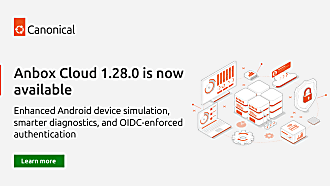Simon Fels
on 20 March 2024
Implementing an Android™ based cloud game streaming service with Anbox Cloud
Since the outset, Anbox Cloud was developed with a variety of use cases for running Android at scale. Cloud gaming, more specifically for casual games as found on most user’s mobile devices, is the most prominent one and growing in popularity. Enterprises are challenged to find a solution that can keep up with the increasing user demand, provide a rich experience and keep costs affordable while shortening the time to market.
Anbox Cloud brings Android from mobile devices to the cloud. This enables service providers to deliver a large and existing ecosystem of games to more users, regardless of their device or operating system. Existing games can be moved to Anbox Cloud with zero to minimal effort.
Canonical has built Anbox Cloud upon existing technologies that allow for a higher container density compared to traditional approaches, which helps to reduce the overall cost of building and operating a game streaming service. The cost structure of a casual game, based in the cloud, also shows that density is key for profitability margins. To achieve density optimisation, three factors must be considered: container density (CPU load, memory capacity and GPU capacity), profitability and user experience optimisation. Additional considerations include choosing the right hardware to match the target workload, intended rendering performance and the pricing sensitivity of gamers. Finding the optimal combination for these factors and adding a layer of automation is crucial to improve profitability margins and to meet SLAs.
To further address specific challenges in cloud gaming, Canonical collaborates with key silicon and cloud partners to build optimised hardware and cloud instance types. Cloud gaming has a high demand on various hardware components, specifically GPUs which provide the underlying foundation for every video streaming solution. Utilising the available hardware with the highest density for cost savings, requires optimisation on every layer. Anbox Cloud specifically helps to get the maximum out of the available hardware capacity. It keeps track of resources spent by all launched containers and optimises placement of new containers based on available capacity and resource requirements of specific containers.
Next to finding the right software and hardware platform, cloud gaming mandates positioning the actual workload as close to the user as possible to reduce latency and ensure a consistent experience. To scale across different geographical regions, Anbox Cloud provides operational tooling and software components to simplify the deployment without manual overhead and ensures users get automatically routed to their nearest location. By plugging individual regions dynamically into a control plane allows new regions to be easily added on the go without any downtime or manual intervention.
Anbox Cloud builds a high-density and easy-to-manage containerisation platform on top of the LXD container hypervisor which helps to minimise the time to market and reduce overall costs. It reflects Canonical’s deep expertise in cloud-native applications and minimises operational overhead in multiple ways. With the use of existing technologies from Canonical like Juju or MAAS, it provides a solid and proven platform which is easy to deploy and maintain. Combined with the Ubuntu Pro support program from Canonical, an enterprise can ensure it gets long-term help whenever needed.
As differentiation is key in building a successful cloud gaming platform, Anbox Cloud provides a solid foundation which is extensible and fits into many different use cases. For example, integrating a custom streaming protocol is possible by writing a plug-in and integrating it via provided customising hooks into the containers which power Anbox Cloud. To make this process easy, Canonical provides an SDK, rich documentation with example plugins and engineering services to help with any development around Anbox Cloud.
In summary, Anbox Cloud provides a feature rich, generic and solid foundation to build a state of the art cloud gaming service which provides optimal utilisation of the underlying hardware to deliver the best user experience while keeping operational costs low.
If you’re interested to learn more, please come and talk to us.
Android is a trademark of Google LLC. Anbox Cloud uses assets available through the Android Open Source Project.



